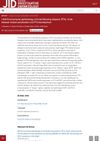 April 2023 in “Journal of Investigative Dermatology”
April 2023 in “Journal of Investigative Dermatology” Being allergic to linalool, a common fragrance ingredient, might contribute to developing frontal fibrosing alopecia.

The CD4 protein may play a role in the behavior of certain skin cells, affecting their growth, movement, and differentiation.
 June 2022 in “Frontiers in Medicine”
June 2022 in “Frontiers in Medicine” Acupuncture and moxibustion may help treat hair loss, but more research is needed.
Certain short peptides can increase root hair growth in tobacco plants.
 February 2022 in “JID Innovations”
February 2022 in “JID Innovations” The Virtual Magic Wand program successfully trained dermatologists in innovation, with most feeling capable of leading innovation teams and many starting companies.

5α-reductase inhibitors are effective for treating hair loss in androgenetic alopecia.
 January 2020 in “Jornal Vascular Brasileiro”
January 2020 in “Jornal Vascular Brasileiro” Anticoagulant therapy may cause hair loss, especially in women, and stopping the medication can lead to hair regrowth.
August 2022 in “Theriogenology” Neurosteroids affect prolactin levels in sheep differently depending on stress and pregnancy conditions.
119 citations,
June 2021 in “Heliyon” Licorice has many health benefits but should be used carefully due to possible side effects.
90 citations,
April 2013 in “Dermatology online journal” Different treatments for Hidradenitis suppurativa range from antibiotics and hormonal therapies to surgery, depending on severity.
87 citations,
March 2013 in “Expert Review of Anticancer Therapy” Afatinib often causes skin problems that need proactive management.
51 citations,
December 2017 in “Skin Appendage Disorders” Stress may trigger hair loss by affecting immune protection in hair follicles.
28 citations,
June 2015 in “Journal of circadian rhythms” An individual's morning or evening preference can predict changes in their body clock gene expression.
 22 citations,
January 2017 in “Indian Dermatology Online Journal”
22 citations,
January 2017 in “Indian Dermatology Online Journal” Body hair transplants can treat baldness but differ from scalp hair and need more research on long-term results and side effects.
21 citations,
June 2009 in “Mammalian genome” A new mutation in the Hr gene causes hair loss in mice, similar to a human hair disorder.
 18 citations,
October 2021 in “Frontiers in Physiology”
18 citations,
October 2021 in “Frontiers in Physiology” Lipocalin-Type Prostaglandin D2 Synthase (L-PGDS) is a protein that plays many roles in the body, including sleep regulation, pain management, food intake, and protection against harmful substances. It also affects fat metabolism, glucose intolerance, cell maturation, and is involved in various diseases like diabetes, cancer, and arthritis. It can influence sex organ development and embryonic cell differentiation, and its levels can be used as a diagnostic marker for certain conditions.
 14 citations,
August 2021 in “Diabetes, Metabolic Syndrome and Obesity: Targets and Therapy”
14 citations,
August 2021 in “Diabetes, Metabolic Syndrome and Obesity: Targets and Therapy” Metformin, a diabetes drug, may help prevent and treat various cancers, but more research is needed.
 14 citations,
January 2008 in “Dermatology Online Journal”
14 citations,
January 2008 in “Dermatology Online Journal” Hormonal therapies like cyproterone acetate and spironolactone may help some women with hair loss, but finasteride 1mg is not useful, and the effectiveness of other treatments is still unclear.
 13 citations,
October 2019 in “Journal of lasers in medical sciences”
13 citations,
October 2019 in “Journal of lasers in medical sciences” CO2 laser treatment for aging skin significantly changes immune system-related genes.
 7 citations,
August 2023 in “Journal of the American Academy of Dermatology”
7 citations,
August 2023 in “Journal of the American Academy of Dermatology” JAK inhibitors offer new hope for treating severe alopecia areata.
4 citations,
May 2012 in “BMJ Case Reports” A Nigerian baby with neonatal lupus got better with treatment by 6 months.
 3 citations,
January 2023 in “European Journal of Information Technologies and Computer Science”
3 citations,
January 2023 in “European Journal of Information Technologies and Computer Science” The machine learning model accurately detected hair loss and scalp diseases using processed images.
 3 citations,
October 2021 in “Brain Sciences”
3 citations,
October 2021 in “Brain Sciences” Long-term use of Risperidone may be linked to a serious skin condition in bipolar patients, affecting their overall well-being.
3 citations,
October 2020 in “Arthritis Care & Research” New tools and criteria have been developed to better assess and treat pediatric lupus.
3 citations,
September 2014 in “SpringerPlus” Human hair loss may have evolved to help increase brain size.
 2 citations,
April 2023 in “Pharmaceuticals”
2 citations,
April 2023 in “Pharmaceuticals” Scopolin and scopoletin from Merremia peltata leaves may help treat hair loss and showed promising results in rabbit tests.
2 citations,
November 2020 in “Journal of Nepal Medical Association” PCOS is often linked with menstrual issues, hormonal imbalances, and a higher risk of heart disease and diabetes.
 1 citations,
July 2023 in “Cureus”
1 citations,
July 2023 in “Cureus” Some treatments for hereditary hair loss are effective but vary in results and side effects; new therapies show promise but need more research.
 1 citations,
May 2023 in “International Journal of Applied Pharmaceutics”
1 citations,
May 2023 in “International Journal of Applied Pharmaceutics” Placenta extract in novasomes improved rat hair growth better than minoxidil and placenta extract in liposomes.
 1 citations,
May 2023 in “European Journal of Human Genetics”
1 citations,
May 2023 in “European Journal of Human Genetics” Rare ULBP3 gene changes may raise the risk of Alopecia areata, a certain FAS gene deletion could cause a dysfunctional protein in an immune disorder, and having one copy of a specific genetic deletion is okay, but two copies cause sickle cell disease.


















